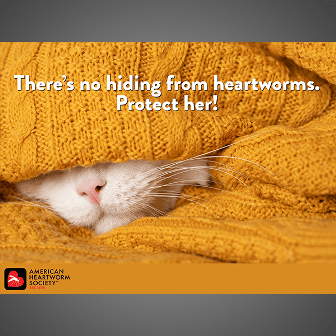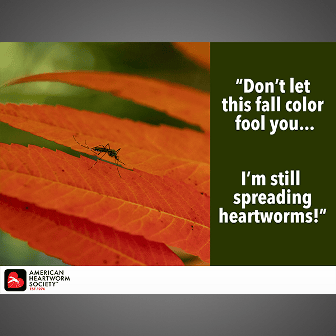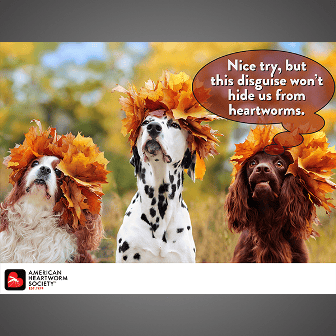What happens if my dog tests positive for heartworms?
 No one wants to hear that their dog has heartworm, but the good news is that most infected dogs can be successfully treated. The goal is to first stabilize your dog if he is showing signs of disease, then kill all adult and immature worms while keeping the side effects of treatment to a minimum.
No one wants to hear that their dog has heartworm, but the good news is that most infected dogs can be successfully treated. The goal is to first stabilize your dog if he is showing signs of disease, then kill all adult and immature worms while keeping the side effects of treatment to a minimum.
Here's what you should expect if your dog tests positive:
- Confirm the diagnosis. Once a dog tests positive on an antigen test, the diagnosis should be confirmed with an additional—and different—test. Because the treatment regimen for heartworm is both expensive and complex, your veterinarian will want to be absolutely sure that treatment is necessary.
- Restrict exercise. This requirement might be difficult to adhere to, especially if your dog is accustomed to being active. But your dog’s normal physical activities must be restricted as soon as the diagnosis is confirmed, because physical exertion increases the rate at which the heartworms cause damage in the heart and lungs. The more severe the symptoms, the less activity your dog should have.
- Stabilize your dog's disease. Before actual heartworm treatment can begin, your dog’s condition may need to be stabilized with appropriate therapy. In severe cases of heartworm disease, or when a dog has another serious condition, the process can take several months.
- Administer treatment. Once your veterinarian has determined your dog is stable and ready for heartworm treatment, he or she will recommend a treatment protocol involving several steps. The American Heartworm Society has guidelines for developing this plan of attack. Dogs with no signs or mild signs of heartworm disease, such as cough or exercise intolerance, have a high success rate with treatment. More severe disease can also be successfully treated, but the possibility of complications is greater. The severity of heartworm disease does not always correlate with the severity of symptoms, and dogs with many worms may have few or no symptoms early in the course of the disease.
- Test (and prevent) for success. Approximately 6 months after treatment is completed, your veterinarian will perform a heartworm test to confirm that all heartworms have been eliminated. To avoid the possibility of your dog contracting heartworm disease again, you will want to administer heartworm prevention year-round for the rest of his life.
My dog has heartworms. My vet started her on monthly prevention before he started treatment. Is this OK?
Yes, it is recommended in the American Heartworm Society's Guidelines to do so. This should be done under the direct supervision of a veterinarian because dogs with microfilaria (baby worms in the blood that the mosquito picks up when feeding) could possibly have a reaction to the preventive. And while this is an extra-label use of heartworm preventives, it is appropriate under the supervision of a veterinarian. However, it is important that your veterinarian assesses the severity of the disease and chooses the proper preventive accordingly. By starting the prevention program you are ensuring that your dog will not get a new heartworm infection while being treated for the existing heartworm disease. Furthermore, you are helping to keep your dog from being a source of heartworm larvae (microfilaria) for mosquitoes to pick up and eventually infect other dogs. This approach makes the treatment of the existing infection more effective.
My dog has heartworms. My veterinarian recommends a series of injections, hospitalization, pain medication, and lab work to safely treat my pet. Is there any other treatment available?
Your veterinarian is recommending what is best. Only one drug, which is called melarsomine, is approved by the U.S. Food and Drug Administration (FDA) for treatment of heartworm infection in dogs; this drug should be administered by injection in the veterinary hospital. Although there are some risks associated with this medication’s use, most adult worms die quickly and can be eliminated within 1 to 3 months. Cage rest and drastically restricted exercise during this period can decrease the chances of complications from treatment.
Along with melarsomine, the heartworm treatment protocol recommended by the American Heartworm Society includes several other medications that help improve the chances of treatment success and reduce the incidence of side effects. This includes administering a heartworm preventive medication to an infected dog for 2 months prior to melarsomine treatment. Long-term, continuous use of heartworm preventives alone to treat heartworm infections, however, is not recommended as an alternative to melarsomine, because it is well documented that additional damage to the heart and lungs occurs the longer adult heartworms are present.
My dog is going to be treated for heartworms. Why does she have to be restricted her exercise restricted for so long? What can I do to help her from being bored?
Killing the heartworms that live in the dog’s bloodstream is essential to restoring your dog’s health, but at the same time, the death of the worms—which can grow to be a foot long or longer—poses risks. When heartworms die, pieces of the decomposing worm bodies can block blood vessels in the lungs, causing a potentially fatal pulmonary embolism (blood clot). If the dog’s heart rate is increased by exercise or excitement, the worm pieces can be forced into the tiny blood vessels of the lungs, increasing the chances of complications.
Keep your dog indoors and/or in a kennel most of the time. When he needs to go outside to relieve himself, keep his leash on, so that a sudden encounter with a squirrel or other distraction doesn’t send him running.
For more ideas and tips on how to help your dog cope during recovery, see our Think 12 Fact Sheet on the subject.
My dog was treated for heartworm 4 months ago and his heartworm test is still positive. What does this mean?
After treating a dog with melarsomine injections, adult worms may continue to die for more than a month following this treatment. Heartworm antigen testing is the most reliable method of confirming that all of the adult heartworms have been eliminated. Although many dogs are antigen-negative 16 weeks after treatment, it can take longer for the antigen to be completely cleared from some dogs. Additionally, even though melarsomine is highly effective, a single course of treatment may not completely clear all dogs of infection (the American Heartworm Society protocol calls for three separate injections of melarsomine. Consequently, in most cases, a dog that is still antigen positive at 4 months should be rechecked 2 to 3 months later before determining whether there are still adult heartworms remaining, and a second treatment course may be required.







